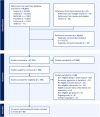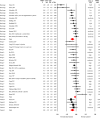The Efficacy of Nutritional Interventions in Reducing Childhood/Youth Aggressive and Antisocial Behavior: A Mixed-Methods Systematic Review and Meta-Analysis
- PMID: 40786968
- PMCID: PMC12335748
- DOI: 10.1002/cl2.70059
The Efficacy of Nutritional Interventions in Reducing Childhood/Youth Aggressive and Antisocial Behavior: A Mixed-Methods Systematic Review and Meta-Analysis
Abstract
Aggressive/antisocial behaviors in children and youth may result in impairments in family, social, or academic functioning and lead to long-term negative consequences for both the individual and society as a whole. The potential of healthy diet and nutritional supplements to reduce aggression and antisocial behavior is an active area of study in nutritional mental health sciences. The goal of this systematic review is to (1) investigate the effectiveness/efficacy of nutritional interventions (dietary manipulation, fortification or supplementation) in reducing excessive aggression, antisocial behaviors, and criminal offending in children/youth (systematic review and meta-analysis); and (2) provide an overview of implementation barriers and facilitators regarding nutritional interventions in children/youth (qualitative/narrative synthesis). After consulting the Campbell Collaboration's methodological guidelines, a comprehensive search for published and unpublished papers on controlled intervention studies was performed (up to February 26, 2024) using both electronic databases (MEDLINE, Embase, Cochrane Library, APA PsycInfo, Scopus, and the Allied and Complementary Medicine Database) and other resources (e.g., Google Scholar, reference list of included studies and other reviews, websites of public health agencies). This study focuses on children and youth (up to the age of 24) presenting with an above-average level of aggression/antisocial behavior. In terms of the intervention, we considered both dietary manipulation and nutritional supplementation with a duration long enough (minimum of 1 week) that a significant change in the individual's nutritional status could be expected. We included studies with a controlled design if, for outcomes, they reported on (1) behavioral-level violence/aggression toward others in real-life (non-simulated) settings, (2) antisocial behaviors, or (3) criminal offending. Initial screening, checking for eligibility criteria, data extraction from, and risk of bias assessment for each eligible study were conducted independently by two reviewers. To perform the meta-analysis, data from each original report were standardized (transformed into Hedges' g) so that results across studies could be meaningfully combined and interpreted. Data conversions, computation of pooled effect sizes, and estimation of publication bias were conducted using the Comprehensive Meta-analysis software (Version 4). Altogether, 51 reports (describing 50 individual studies) met our inclusion criteria, and 72 effect sizes were extracted from these reports. Nutritional interventions with a broad target (e.g., broad-spectrum micronutrient supplementation or general improvement in diet quality) had the most consistent and largest intervention benefit across all outcomes (aggression: k = 7, N = 797, g = -0.31, 95% CI = -0.50 to -0.12, p = 0.001; antisocial behavior: k = 13, N = 2109, g = -0.49, 95% CI = -0.73 to -0.24, p < 0.001; criminal offending: k = 2, N = 117, g = -1.25, 95% CI = -2.39 to -0.11, p = 0.031). These intervention benefits range from small (aggression) through medium (antisocial behavior) to large (offending), and for each outcome, dietary change was considerably more effective than supplementation. Eliminating studies with high risk of bias reduced the treatment benefit to close to zero regarding aggression and small in relation to antisocial behaviors. The most commonly studied narrow-focused nutritional intervention was omega-3 fatty acid supplementation with a small, beneficial effect and with less consistency in statistical reliability across outcomes (aggression: k = 9, N = 706, g = -0.33, 95% CI = -0.87 to 0.22, p = 0.240; antisocial behavior: k = 21, N = 2,081, g = -0.15, 95% CI = -0.26 to -0.03, p = 0.013). Eliminating studies with a high risk of bias did not change the small effect size related to aggression, but further reduced the negligibly small effect size regarding antisocial behavior. Pooled effect size for vitamin D supplementation showed small-to-moderate treatment benefit in terms of antisocial behaviors (k = 4, N = 226, g = -0.48, 95% CI = -0.74 to -0.22, p < 0.001). Elimination of studies with a high risk of bias reduced the effect size from moderate to small. The overall number of and sample size in some of the studies limit our confidence in the validity of the above meta-analytic results. Further, prediction intervals always included the possibility of no effect, suggesting considerable heterogeneity in the data. While there were several studies on other narrow-focused nutritional interventions, these were not studied frequently enough to allow the generation of even preliminary meta-analytic conclusions. A large set of barriers and facilitators to the implementation of nutritional interventions was also identified and narratively summarized. While the evidence on nutritional interventions to reduce aggression/antisocial behaviors is not conclusive, these interventions are safe (especially compared to psychotropic medications), easy-to-implement (especially nutritional supplements), and cheap (especially on the societal level). These characteristics make such interventions feasible and desirable, especially as their benefits are not aggression-specific: good nutritional status is the basis for both physical and mental health in general; and therefore, investment in - especially broad-spectrum - nutritional interventions seems warranted.
© 2025 The Author(s). Campbell Systematic Reviews published by John Wiley & Sons Ltd on behalf of The Campbell Collaboration.
Conflict of interest statement
Olivia Choy was involved in the publication of two randomized controlled trials of omega‐3/vitamin D supplementation on young people who have offended and children with externalizing behavior disorders. The other authors declare no conflicts of interest.
Figures








Similar articles
-
Falls prevention interventions for community-dwelling older adults: systematic review and meta-analysis of benefits, harms, and patient values and preferences.Syst Rev. 2024 Nov 26;13(1):289. doi: 10.1186/s13643-024-02681-3. Syst Rev. 2024. PMID: 39593159 Free PMC article.
-
Nutritional interventions for survivors of childhood cancer.Cochrane Database Syst Rev. 2016 Aug 22;2016(8):CD009678. doi: 10.1002/14651858.CD009678.pub2. Cochrane Database Syst Rev. 2016. PMID: 27545902 Free PMC article.
-
Education support services for improving school engagement and academic performance of children and adolescents with a chronic health condition.Cochrane Database Syst Rev. 2023 Feb 8;2(2):CD011538. doi: 10.1002/14651858.CD011538.pub2. Cochrane Database Syst Rev. 2023. PMID: 36752365 Free PMC article.
-
Systemic pharmacological treatments for chronic plaque psoriasis: a network meta-analysis.Cochrane Database Syst Rev. 2021 Apr 19;4(4):CD011535. doi: 10.1002/14651858.CD011535.pub4. Cochrane Database Syst Rev. 2021. Update in: Cochrane Database Syst Rev. 2022 May 23;5:CD011535. doi: 10.1002/14651858.CD011535.pub5. PMID: 33871055 Free PMC article. Updated.
-
Survivor, family and professional experiences of psychosocial interventions for sexual abuse and violence: a qualitative evidence synthesis.Cochrane Database Syst Rev. 2022 Oct 4;10(10):CD013648. doi: 10.1002/14651858.CD013648.pub2. Cochrane Database Syst Rev. 2022. PMID: 36194890 Free PMC article.
References
-
- Adesanya, D. O. , Johnson J., and Galanter C. A.. 2022. “Assessing and Treating Aggression in Children and Adolescents.” Pediatric Medicine 5: 18. 10.21037/pm-20-109. - DOI
Publication types
LinkOut - more resources
Full Text Sources
Miscellaneous
